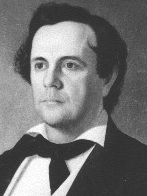Nathaniel Green Taylor facts for kids
Quick facts for kids
Nathaniel Green Taylor
|
|
|---|---|
 |
|
| Commissioner of Indian Affairs | |
| In office March 26, 1867 – 1869 |
|
| President | Andrew Johnson |
| Preceded by | Lewis V. Bogy |
| Succeeded by | Ely S. Parker |
| Member of the U.S. House of Representatives from Tennessee's 1st district |
|
| In office July 24, 1866 – March 3, 1867 |
|
| Preceded by | Thomas Amos Rogers Nelson |
| Succeeded by | Roderick R. Butler |
| In office March 30, 1854 – March 3, 1855 |
|
| Preceded by | Brookins Campbell |
| Succeeded by | Albert Galiton Watkins |
| Personal details | |
| Born | December 29, 1819 Happy Valley, Carter County, Tennessee |
| Died | April 1, 1887 (aged 67) Happy Valley, Carter County, Tennessee |
| Political party | Whig American Unionist |
| Spouse | Emma Haynes Taylor |
| Relations | Alfred A. Taylor (son) Robert Love Taylor (son) William B. Carter (uncle) Samuel P. Carter (cousin) Landon Carter Haynes (brother-in-law) |
| Alma mater | Washington College Academy Princeton University |
| Profession | lawyer, farmer, preacher |
Nathaniel Green Taylor (December 29, 1819 – April 1, 1887) was an American lawyer, farmer, and politician from Tennessee. He served as a U.S. Representative for Tennessee from 1854 to 1855, and again from 1866 to 1867. He also held an important role as the Commissioner of Indian Affairs from 1867 to 1869.
Contents
Early Life and Family Background
Nathaniel Green Taylor was born in a place called Happy Valley in Carter County, Tennessee. His parents were James Patton Taylor and Mary Carter. His family was well-known in Carter County.
Family History and Education
Nathaniel's grandfather, General Nathaniel Taylor, was one of the first people to settle in the area. He was also the county's first sheriff. Nathaniel Green Taylor's other grandfather, Landon Carter, was a veteran of the American Revolutionary War. Carter County was named after him.
Nathaniel Green Taylor studied privately before going to Washington College near Jonesborough, Tennessee. He later graduated from Princeton College in 1840. After that, he studied law and became a lawyer in 1841. He started his law practice in Elizabethton, Tennessee.
Taylor's Marriage and Children
Taylor married Emmaline (Emma) Haynes. Her brother, Landon Carter Haynes, was a politician who later became a Confederate senator. Nathaniel and Emma had six sons and seven daughters who survived them. Two of their sons, Alfred A. Taylor and Robert Love Taylor, both became members of Congress and governors of Tennessee. Alfred was a Republican, and Robert was a Democrat.
Political Career and Public Service
Nathaniel Green Taylor had a long career in politics, serving in different roles.
First Time in Congress
In 1853, Taylor ran for U.S. Representative for Tennessee's 1st congressional district. He was a member of the Whig Party. He lost that election by a very small number of votes.
However, the person who won, Brookins Campbell, passed away. So, a special election was held in 1854 to fill the empty seat. Taylor won this election. He served in the Thirty-third Congress from March 30, 1854, to March 3, 1855. He tried to get re-elected in 1855 but lost again by a small margin. In 1857, he ran as an "American" candidate but lost once more.
Civil War and Return to Congress
In 1860, Taylor supported the Constitutional Union ticket for president. During the American Civil War, even though Tennessee joined the Confederacy, Taylor supported the Union. He helped people in East Tennessee who also supported the Union. He also gave speeches in the northeastern U.S. to help their cause.
After the Civil War, Tennessee was allowed to have representatives in Congress again in 1866. Taylor was elected as a Representative from the 1st district once more. This time, he ran as a Unionist candidate. He served in the Thirty-ninth Congress from July 24, 1866, to March 3, 1867.
Commissioner of Indian Affairs
Taylor did not run for re-election in 1867. Instead, President Andrew Johnson appointed him as the Commissioner of Indian Affairs. He started this role on March 26, 1867.
As Commissioner, Taylor worked for about two years. He traveled to Kansas to try and help settle conflicts during the Plains Wars. He even took his 19-year-old son, Alfred, with him. As the head of the Indian Peace Commission, Taylor helped negotiate the Medicine Lodge Treaty. Through this treaty, some Native American tribes, including the Kiowa, Apache, and Comanche, agreed to move to a reservation in Indian Territory. They also gave up their traditional lands, which included parts of what is now Kansas.
Later Life and Family Politics
After retiring from his role as Commissioner on April 21, 1869, Taylor went back to Tennessee. He spent his time farming and preaching in Carter County.
In 1886, his sons Alfred and Robert both ran for governor. Alfred was a Republican, and Robert was a Democrat. The Prohibition Party offered their nomination to Nathaniel Taylor, hoping to make it a unique three-way family race. However, Taylor decided not to run.
Death and Burial
Nathaniel Green Taylor passed away in Happy Valley, Tennessee, on April 1, 1887. He is buried with other family members in the Old Taylor Cemetery in Elizabethton, Tennessee.
 | Georgia Louise Harris Brown |
 | Julian Abele |
 | Norma Merrick Sklarek |
 | William Sidney Pittman |

